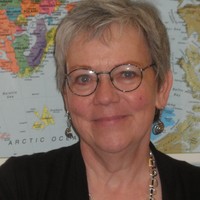
When the American Sociological Association meets Aug. 22-25, its section on Marxist sociology will be celebrating its 40th anniversary in a most appropriate venue: Chicago, the historic center of struggle for the rights of working people and the birthplace of many progressive organizations.
During the ASA meeting, the Marxist Sociology Section will host a reception at the editorial offices of the People’s World, the online successor to the original radical working-class newspaper, the Daily Worker, founded in 1924. These offices are housed in Bridgeport, a neighborhood just north of the famed Chicago stockyards, which employed numerous African American and immigrant stockyard workers, in a building named Unity Center. It is owned by the Workers’ Education Society – originally the Lithuanian Workers’ Education Society. Lithuanians made up a substantial number of the immigrant stockyard workers. The stockyards were the setting for the famous novel by Upton Sinclair, “The Jungle.” The center boasts a substantial library of books relevant to Marxism, labor, civil rights and political struggles, as well as a collection of unique working-class artwork.
The ASA Marxist Sociology Section “promotes the use of Marxist theory and methods to explain the complex dynamics of the social world, from ideology and the capitalist system to revolutionary, counter-hegemonic movements; from global political economy and national institutions to the politics of the workplace; from economic development and technological change to politics and culture; from imperialism to the environment. We aim to provide a platform for young Marxist sociologists at the beginnings of their careers and to serve as a resource and meeting point for all scholars and activists whose work is informed by Marxist theory.”
It was in Chicago that Mother Jones first joined the Knights of Labor in the wake of the Great Chicago Fire of 1871, that William Z. Foster planned the Steel Strike of 1919, and that anti-war protesters and police clashed for eight days outside the Democratic National Convention in 1968. Nobel Peace Prize winner Jane Addams founded Hull House here and fought tirelessly to improve working conditions for Chicago’s immigrant workers. Addams was a charter member of the organization now known as the American Sociological Association.
Among progressives, Chicago is probably best known for its role in the origin of the International Workers’ Day that is celebrated around the world every May 1. The holiday began as a commemoration of the Haymarket Martyrs, four protesters who were summarily executed in the wake of the May 1, 1886, strike for an eight-hour day. The May 1 strike was the culmination of years of bitter and often violent struggles for labor rights led by the militant activists with the Federation of Organized Trades and Labor Unions. Marxist sociologists might want to visit the Haymarket Martyrs Monument in Forest Park’s Waldheim/Forest Home Cemetery, where the remains of William Z. Foster, Elizabeth Gurley Flynn, William L. Patterson, and other champions of organized labor are also interred.
The struggle for the eight-hour day that centered in Chicago did not escape the attention of Karl Marx himself, who commented on it in Volume One of Capital. Likewise, Marx had the attention of Chicago. A Chicago Tribune reporter twice visited Marx in his London home, and in 1879 the paper printed an extensive article quoting the “venerable exile” on international political and economic developments, including the struggles of organized labor then under way in Chicago.
Chicago is the birthplace of many foundational progressive organizations, beginning with the Revolutionary Socialist Party founded in Chicago in 1881. The Industrial Workers of the World (IWW), known as the Wobblies, was founded here in June, 1905, by Big Bill Haywood, Eugene Debs, and others. The Communist Party USA emerged during a Chicago conference of Socialist Party members in September 1919 and established its first headquarters on Blue Island Avenue in Chicago’s Near East Side.
This year’s theme for the ASA Annual Meeting is “Sexualities in the Social World.” Sex usually occurs in private and is seen as deeply personal, yet it is also profoundly social. Paula England of New York University and ASA president writes, “Cultural norms and social institutions such as religion, education, mass media, law, and the military all affect what we do sexually with whom. These social forces also affect what is seen as beyond the bounds of legitimacy. Indeed, contemporary politics are full of contentious debates about abortion, sex education, same-sex marriage, pornography, sex work, sexual harassment, systematic rape as a weapon in wars, and female genital cutting.”
The reception will feature a tour of the Unity Center, food and drink, and special welcome from the editors and staff of peoplesworld.org.












Comments